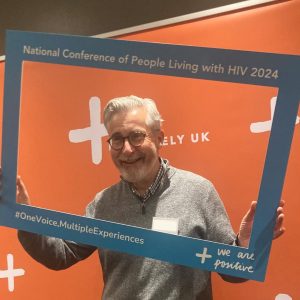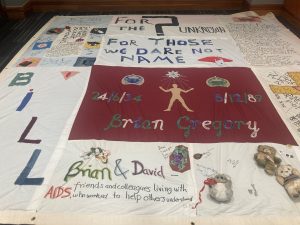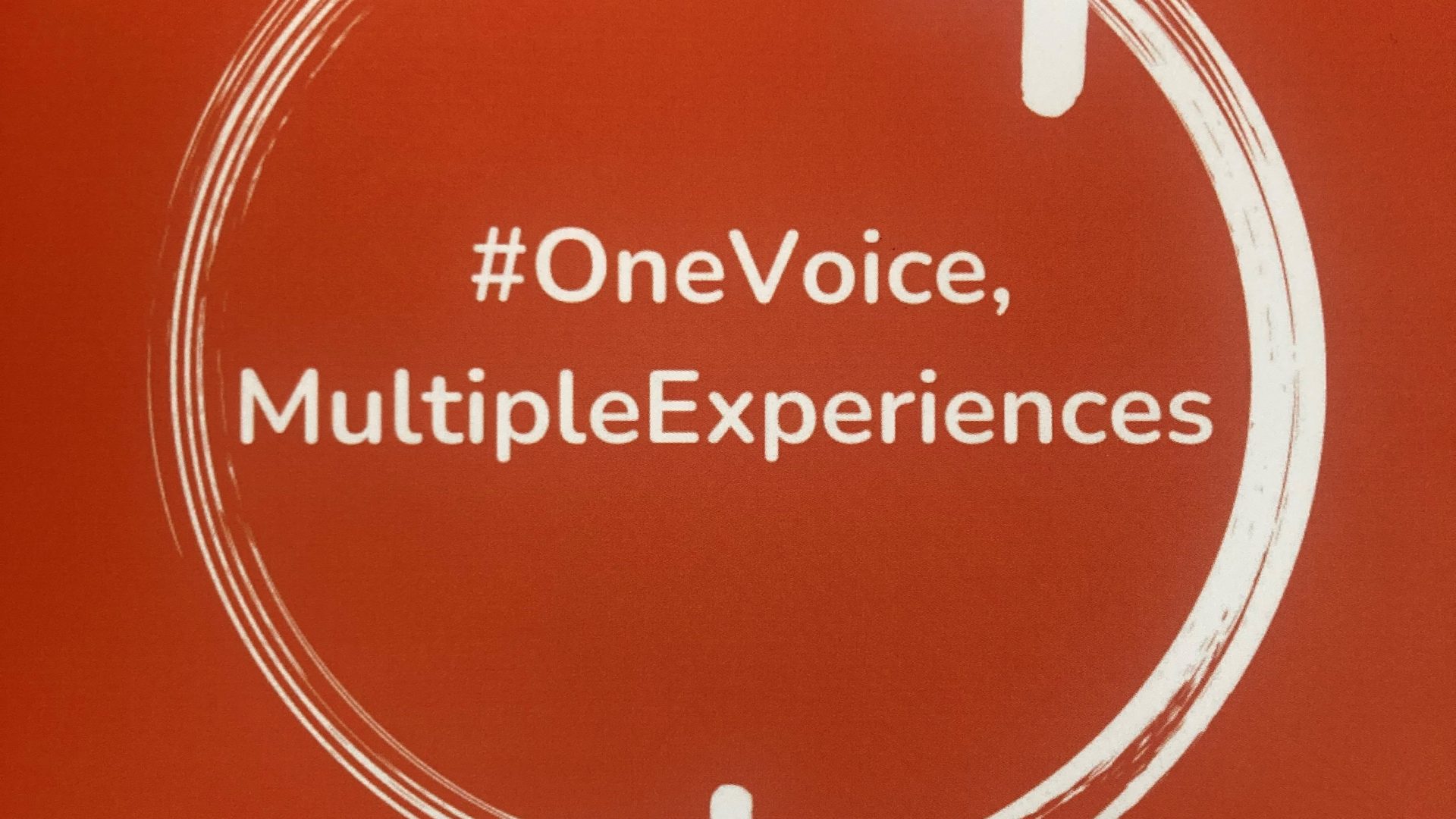The Conference is a crucial platform for people living with HIV to connect, hear about changes in health and social care and identify what issues are important for the community. This year’s Conference, themed ‘One Voice, Multiple Experiences,’ was a celebration of the diverse and unique journeys of people living with HIV.
Waverley Care’s Peer Support & Volunteer Coordinator, Iain, shares his experience attending the 6th National Conference for People Living with HIV:

Iain at the conference
It was an absolute privilege to attend the National Conference for People Living with HIV in London. It was a packed and empowering day, and I highly recommend everyone living with HIV attend. Here are some of my experiences and takeaways from the day…
First of all, being in a room with 200 people, all of us living with HIV was a unique and profoundly impactful experience. The feeling of support, community, and acceptance was quite awesome.
It was disappointing that only ten registrations were from Scotland. Hopefully, in 2026, we can encourage more Scots to participate. However, it was inspiring to see that attendance was evenly distributed between men and women— nearly 50/50!
Introduction and Inspirational Stories
We started the day with an introduction from the uber-glamorous CEO of Positively UK, Silvia Petretti (wearing the best spectacles I have seen in a long time)!
We then held a poignant minute’s silence in memory of those lost to HIV/AIDS and to show solidarity with those who still lack access to treatment, a sad reality in many parts of the world less fortunate than us here in the UK.
It was then great to hear some inspirational stories, experiences, and expectations from representatives of different communities, including women, straight men, trans people, gay people, and someone born with HIV. These were very different journeys, but all were part of the overall community of people living with HIV.
Call for a United Approach to HIV Care
Next, we had a very informative talk from Tristan Barber, a leading HIV Consultant, about forming a united approach to the future of HIV care.
This talk reinforced the idea that a care pathway should start with people living with HIV and be based on their requirements, needs, and expectations.
Unfortunately, in many areas, people living with HIV are excluded from the planning of their care. They are simply told what is available, with services designed by NHS teams without input from those living with the virus. This was a good reminder of the principle: “Nothing about us, without us…!”
Addressing Disparities: The Unheard Voices Project
This led nicely to a presentation on the Unheard Voices project, a collaboration between One Voice Network and NAT. The project addresses disparities in HIV and broader health/well-being outcomes within Black communities.
It is predominantly London-centric, but they are looking to involve other areas. So, for Scotland, this could be a fantastic opportunity to be heard and contribute to a wider study on how services are planned and delivered in different areas and communities living with and at risk of HIV. Read more about it here.

National AIDS Quilt
Challenges and Opportunities in Scotland
I was shocked to discover that only one clinic in Scotland is participating in the Positive Voices Survey. This means the experiences of those living in Scotland are significantly underrepresented compared to the 99 participating clinics in England. Come on, Scotland…we can do better!
Interestingly, although 97% of respondents knew about U=U, only 65% actually trusted the statement despite its clinically proven facts.
There is still a lot of education needed to raise awareness around U=U! Additionally, there is much work to be done around Peer Support (more on that later…), as 50% of respondents believe that the need for peer support in their area is unmet. I would certainly agree with that.
Workshops and Personal Reflections
The main challenge at the conference, and perhaps why it should span over two days, is the packed schedule of workshops. I wanted to attend all of them, but sadly, the time allowed for selecting only two! After considering what would be most beneficial, not just for me but also for bringing back to work, I decided on Peer Support, followed by Mental Health.
I had a great experience chatting with Peer Supporters and Peer Navigators from around the country, learning about how they organise and deliver peer support in their areas, and being able to share what we offer for peer support through Waverley Care. It’s encouraging that we all want to see National Standards for Peer Support and a universal approach.
It was super encouraging (but also a little disheartening) to see how advanced embedded peer support is in some areas and the huge benefits this is bringing to outcomes surrounding living well with HIV, compared to how far we still have to go in Scotland.
Additionally, where embedded peer support is working well, the support is provided by paid peers, which would certainly help recruit and retain peers instead of relying on volunteer peers, as we still do in Scotland.
I left the session motivated to push on with trying to achieve a universal peer support network in Scotland with National Standards, persuade the NHS to embrace embedded peer support, and set up the systems to allow this to happen.
One of the main takeaways from the Mental Health workshop (something I wasn’t expecting!) was the importance of accepting that HIV is NOT like other long-term health conditions.
While we often try to emphasise that HIV is just a virus, a manageable health condition—which it is in many ways—HIV remains highly stigmatised. Despite efforts to educate and normalise HIV, stigma persists and has a significant impact on the mental health of people living with HIV. This is a reality we must recognise and address as part of ongoing support.
Even if HIV is not the primary cause of mental health issues, it can magnify other underlying problems, sort of like “you have this, this, and this to deal with, and oh, don’t forget you have HIV!”
This session prompted me to confront my mental health battles and how I handle them versus how I should handle them. It was a shock in some ways to face my own issues, but it was hugely beneficial in realising what I could do going forward.
Looking Ahead to 2026
Towards the end of the conference, a summary was provided highlighting the key insights from each workshop. This gave us a glimpse into the ones we did not manage to attend and left us eager for the next conference!
The day concluded with an African drumming group taking to the stage. They quickly got everyone on their feet and danced to the beats—some with more rhythm than others!

